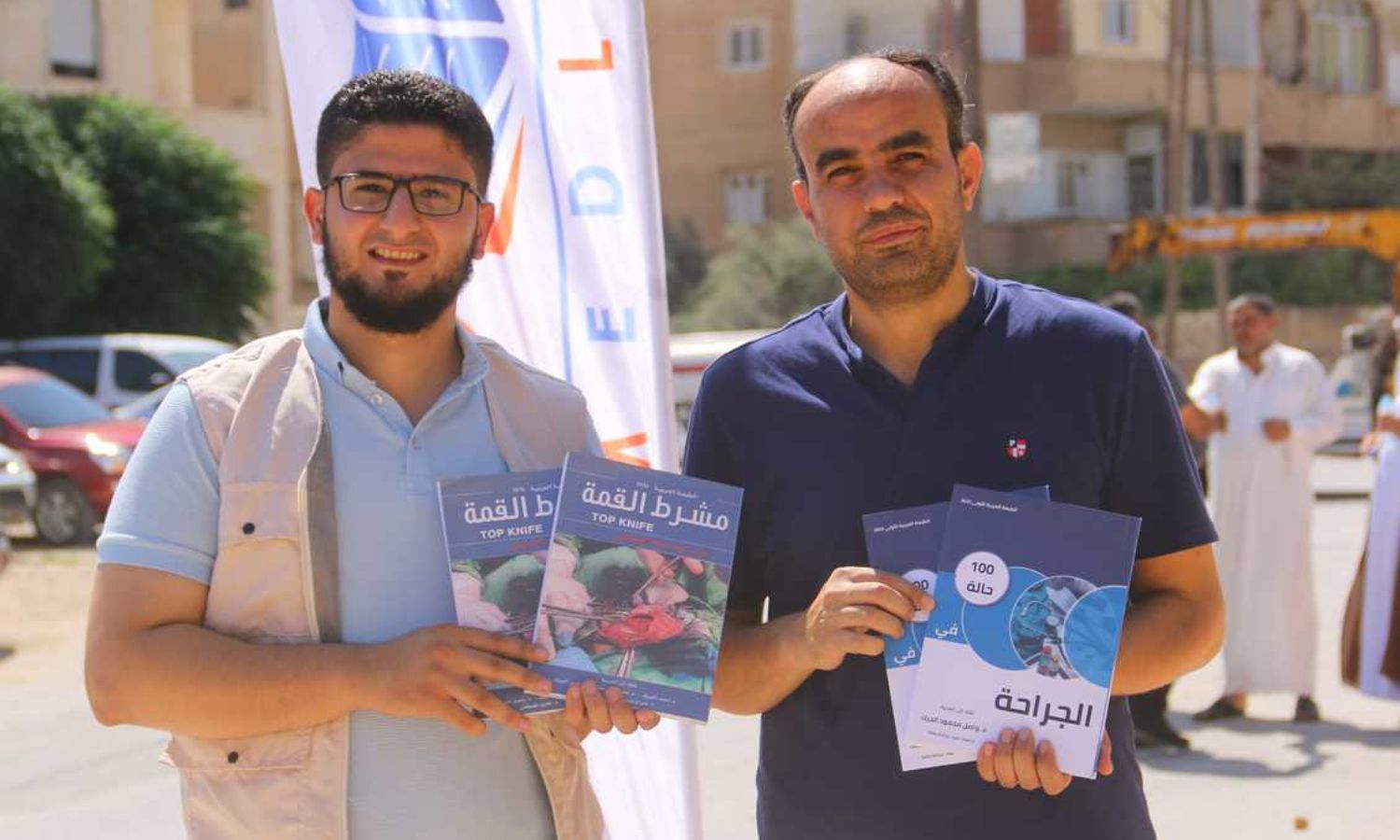



Enab Baladi – Idlib
“After the first book I translated in 2011, the idea of translation persisted as an obsession of mine. With the need for information sources and references in Arabic in the liberated north, the idea was brought up to the attention of specialized doctors, to be eventually approved” with these words, Dr. Wasel al-Jarak, recalled his beginnings in the Arabization of books.
The Syrian doctor spoke about the first book he translated, “100 Cases in Surgery”, at the beginning of his years of specialization during his medical studies at the Aleppo University Hospital. During the early years of the Syrian revolution, circumstances did not allow him to pursue translation when there was a rising need, with few libraries and publishing houses in opposition-held areas.
Novel references for medical courses are necessary as processing techniques and tools are constantly evolving, Dr. al-Jarak explicated. Considering that the educational system in Syria relied on the Arabic language for most of the human medicine courses, there was a greater need for Arabized books.
Dr. Wasel al-Jarak collectively Arabized the books with several surgeons, most of whom had previously worked with him in field hospitals within opposition-held areas.
According to al-Jarak, the need for these books arose in the regions of northern Syria after multiple traumatic injuries to people as a result of each raid or artillery shelling on the region on the one hand, and the lack of experience in the field of trauma surgery because it was not part of the curriculums in human medicine colleges in Syria previously.
His second book, The Top Scalpel, was published in 2016 as an Arabized version of the book Top Knife: The Art & Craft of Trauma Surgery by Dr. Asher Hirshberg and Dr. Kenneth L. Mattox, in collaboration with several Syrian doctors specializing in trauma surgery in northern Syria. The book was popular and widespread among doctors working in the field because of the need for it.
The third book has not yet seen the light of day because of its need for modifications and improvements. Although one of the surgical references, the doctors involved in it did not have enough time to finish working on it, with al-Jarak confirming that the book is within an action plan for its release at the very earliest.
As for the fourth, most recent book, it deals with a “unique” topic, according to al-Jarak’s description; it is titled Pediatric Critical Surgical Care. It was translated by several specialized doctors led by Dr. Mohammad Baath, a specialist in the field, and was published about three months ago.
According to al-Jarak, the translation of the fifth book, entitled Surgical Complications, has been completed, and it is in the review phase, to be published at the earliest.
Abd al-Rahman Istanbouli, a fourth-year student at the Faculty of Medicine at Aleppo Free University, said that 90% of the curriculum is in Arabic. In his view, the aforementioned Arabized books were useful for explaining medical cases in a practical rather than in a “boring narrative” way.
Istanbouli added that such books help further consolidate learning outcomes, especially during practical studies in hospitals and clinics.
One of the challenges faced by doctors was the lack of publishing houses for printing the Arabized books, while some libraries participating in the Idlib and Azaz book fairs had reached out to the Syrian doctor to take permission to print them and sell copies of the said books within the book fairs without the doctors obtaining any financial returns.
With regard to prices, al-Jarak said that the books mainly interest both students and doctors practicing surgery and that set prices were close to cost and considerate of students’ financial capabilities.
Difficulties in coordinating the work of the team located in geographically different regions, allocating a sufficient number of doctors to review, adhering to time, and finding specialized printing and publishing houses to publish books on paper and electronically were some of the challenges faced by the doctors while working on the Arabized books.
According to a study conducted by researcher Mohammad Ahmad Khalil, published on the website of the Syrian Center for International Relations and Strategic Research (SCIRS) in February 2021 about the reality of higher education in northern Syria, the responses of 31.1% of students participating in the questionnaire were that the extent to which curriculums were linked to the labor market was “weak,” while 45.9% reported “average.”
Students and graduates of north Syria’s public and private universities face difficulty in external recognition of their university-issued academic diplomas, forcing most to accept any job opportunity even if it does not exactly relate to their university major.
if you think the article contain wrong information or you have additional details Send Correction